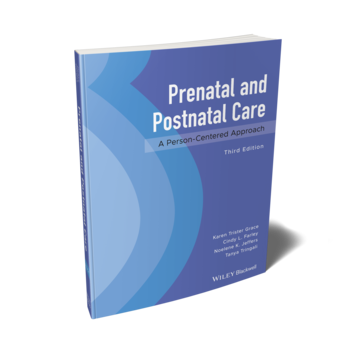In This Story

The third edition of Prenatal and Postnatal Care: A Person-Centered Approach was released today and features Karen Trister Grace, assistant professor in the College’s School of Nursing, as the lead editor. The book provides innovative standards of care for people before, during, and after pregnancy. Grace’s goal is to ensure midwives, nurse practitioners, physician assistants, and other healthcare providers are prepared to employ person-centered care when working with childbearing people.
“Person-centered care is the term we use in this book to describe a philosophy of maternity care that is based on the needs and preferences of the pregnant person. This care emphasizes the importance of informed choice, continuity of care, active participation, best care practices, provider responsiveness, and accessibility, as well as the moral and legal right to decisions regarding bodily integrity and autonomy,” said Grace.
In this latest publication, Grace has emphasized that the text reflects the rapidly changing landscape of health care and human rights in the U.S. while highlighting why it is imperative to take a holistic approach to care.

“Few available obstetric and maternity care texts offer content on prenatal and postnatal care with an appreciation for the effects of the mind-body connection. A focus on the background social dynamics of the pregnant person and their family on overall health and childbearing experience has been lacking,” said Grace. “Content has also been updated to address COVID-19 and the realities of care during a pandemic as well as the threats to reproductive and bodily autonomy of people across the country,” Grace said.
Special care has been taken to ensure language in the book recognizes that not all women have the capacity for pregnancy and that some pregnant people do not identify as women. The editorial team tasked authors with utilizing gender-inclusive and bias-free language.
Central to this initiative was updating the previous subtitle previous edition’s subtitle “A woman-centered approach” to “A person-centered approach.”
In addition to updating the title, highlights of the third edition include new chapters on health equity, ethics in perinatal care, exercise, sexuality, preconception, pregnancy, and postpartum care of LGBTQ+ individuals, violence and trauma in the perinatal period, and occupational and environmental health in pregnancy.
“In revising, we envisioned a book that describes the health disparities and inequities that exist in perinatal health care and outcomes, identifies the ways that racism, bias, and the social determinants of health generate health inequities during pregnancy, birth, postpartum, breastfeeding and early parenting, and finally, provides concrete ways that healthcare providers can disrupt racism, bias, and discrimination at an individual and systematic level,” said Grace.
Grace is an expert on pregnancy intention, health disparities, health equity, and reproductive coercion.
